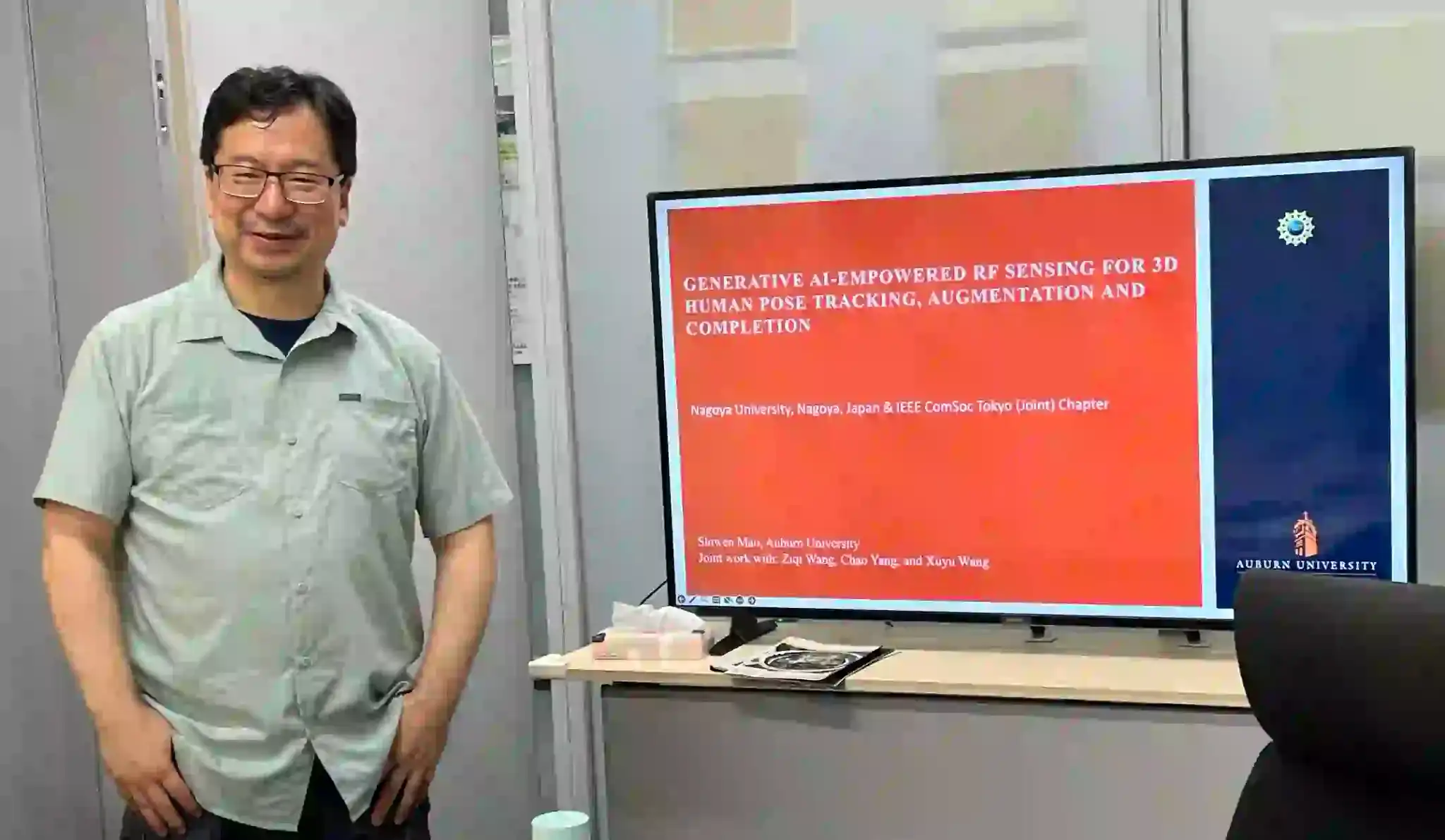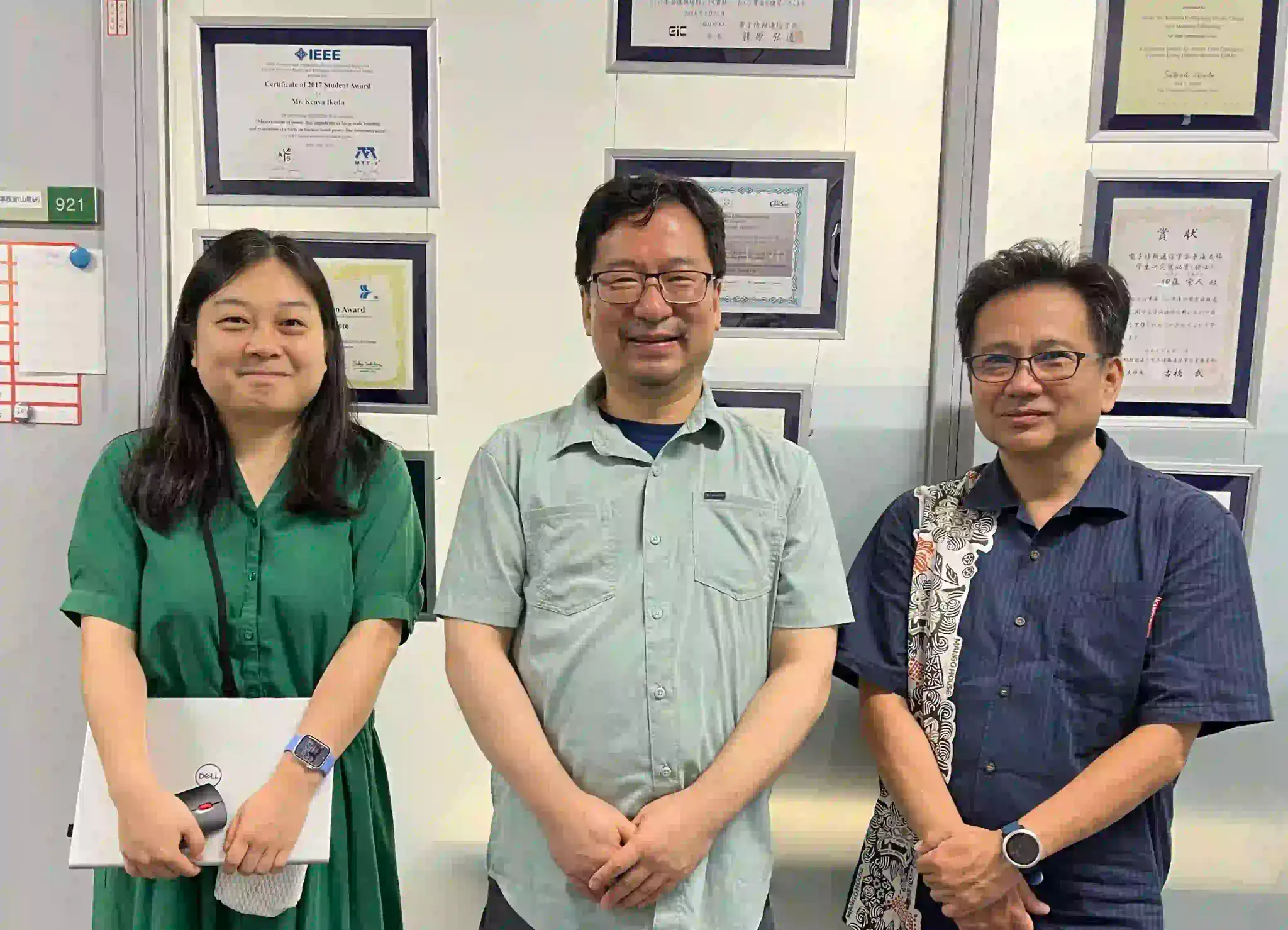DLT at Ritsumeikan University (08/08) and Nagoya University (08/01)
DLT by Prof. Shiwen Mao, Auburn University at Ritsumeikan University and Nagoya University.
DLT at Nagoya University
The time and venue have been changed.
- Date: Friday, 1 August 2025
- Time: 16:00-
- Location: Yamazato Laboratory, IB Denshi-Joho-kan North 9F, Nagoya University.
- Host: Prof Takaya Yamazato
DLT at Ritsumeikan University
- Date: Friday, 8 August 2025
- Time: 14:00-
- Host: Prof Noriaki Kamiyama
- Location: H906 room on the 9th floor of Building H in the Osaka Ibaraki Campus (OIC) of the Ritsumeikan Univ.
オンラインでの聴講参加も募集します。
参加希望の方は、以下のURLからお申し込みください。 登録された方には、後日ZoomのURLをお送りします。
https://forms.gle/3pwLoSD1qcVTtx54A
Title: Generative AI-empowered RF sensing for 3D human pose tracking, augmentation and completion
Speaker: Prof. Shiwen Mao
Abstract:
In recent years, 3D human activity recognition (HAR) has become an important topic in human-computer interaction (HCI). To preserve the privacy of users, there is considerable interest in techniques without using a video camera. In this talk, we first present RFID-Pose, a vision-assisted 3D human pose estimation system based on deep learning (DL), as well as its variations with enhanced generalizability to unseen test subjects and environments. The performance of DL models depends on the availability of sufficient high-quality radio frequency (RF) data, which is more difficult and expensive to collect than other types of data. To overcome this obstacle, in the second part of this talk, we present AIGC approaches to generate labeled synthetic RF data for multiple wireless sensing platforms, such as WiFi, RFID, and mmWave radar, including a conditional Recurrent Generative Adversarial Network (R-GAN) approach and diffusion/latent diffusion based approaches. Finally, we propose a novel framework that leverages latent diffusion transformers to synthesize high quality RF data. This synthetic data augments limited datasets, enabling the training of a subject-adaptive transformer-based kinematics predictor to estimate 3D poses with temporal smoothness from RFID data. Additionally, we introduce a latent diffusion transformer with cross-attention conditioning to accurately infer missing joints in skeletal poses, completing full 25-joint configurations from partial (i.e., 12-joint) inputs. This is the first method to detect 20+ distinct skeletal joints using Generative-AI for RF sensing-based continuous 3D human pose estimation (HPE).
Bio:
Shiwen Mao is a Professor and Earle C. Williams Eminent Scholar and Director of the Wireless Engineering Research and Education Center at Auburn University. Dr. Mao's research interest includes wireless networks, multimedia communications, RF sensing and IoT, smart health, and smart grid. He is the editor-in-chief of IEEE Transactions on Cognitive Communications and Networking, a member-at-large on the Board of Governors of IEEE Communications Society, and Vice President of Technical Activities of IEEE Council on Radio Frequency Identification (CRFID). He received the IEEE ComSoc MMTC Outstanding Researcher Award in 2023, the SEC 2023 Faculty Achievement Award for Auburn, the IEEE ComSoc TC-CSR Distinguished Technical Achievement Award in 2019, the Auburn University Creative Research & Scholarship Award in 2018, the NSF CAREER Award in 2010, and several service awards from IEEE ComSoc. He is a co-recipient of the 2022 Best Journal Paper Award of IEEE ComSoc eHealth Technical Committee, the 2021 Best Paper Award of Elsevier/KeAi Digital Communications and Networks Journal, the 2021 IEEE Internet of Things Journal Best Paper Award, the 2021 IEEE Communications Society Outstanding Paper Award, the IEEE Vehicular Technology Society 2020 Jack Neubauer Memorial Award, the 2018 Best Journal Paper Award and the 2017 Best Conference Paper Award from IEEE ComSoc MMTC, and the 2004 IEEE Communications Society Leonard G. Abraham Prize in the Field of Communications Systems. He is a co-recipient of the Best Paper/Demo Awards of 12 conferences. He is a Fellow of the IEEE. https://www.eng.auburn.edu/users/szm0001/
Report:
The Yamazato Laboratory at Nagoya University hosted Prof. Shiwen Mao from Auburn University and held IEEE ComSoc DLT. This was an event organized by the IEEE ComSoc Tokyo Joint Chapter. Today, Nagoya experienced record-breaking heat, with temperatures reaching 40 degrees Celsius, but we are grateful that Prof. Mao made the trip from Tokyo despite the extreme conditions. Prof. Mao's presentation on his research in AI-emporwe RF sensing was highly engaging and thought-provoking. While details are omitted here, we have included the presentation materials provided by Prof. Mao for reference.
Presentation slides
- GENERATIVE AI-EMPOWERED RF SENSING FOR 3D HUMAN POSE TRACKING, AUGMENTATION AND COMPLETION
- Nagoya University, Nagoya, Japan & IEEE ComSoc Tokyo (Joint) Chapter
- Shiwen Mao, Auburn University
- Joint work with: Ziqi Wang, Chao Yang, and Xuyu Wang

